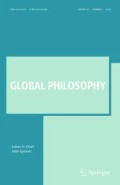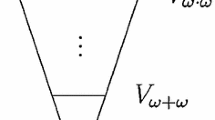Abstract
In this paper I argue for the view that the axioms of ZF are analytic truths of a particular concept of set. By this I mean that these axioms are true by virtue only of the meaning attached to this concept, and, moreover, can be derived from it. Although I assume that the object of ZF is a concept of set, I refrain from asserting either its independent existence, or its dependence on subjectivity. All I presuppose is that this concept is given to us with a certain sense as the objective focus of a ”phenomenologically reduced“ intentional experience.
The concept of set that ZF describes, I claim, is that of a multiplicity of coexisting elements that can, as a consequence, be a member of another multiplicity. A set is conceived as a quantitatively determined collection of objects that is, by necessity, ontologically dependent on its elements, which, on the other hand, must exist independently of it. A close scrutiny of the essential characters of this conception seems to be sufficient to ground the set-theoretic hierarchy and the axioms of ZF.
Similar content being viewed by others
REFERENCES
Barwise, J. (ed.): 1977, Handbook of Mathematical Logic, Amsterdam: North-Holland.
Belaga, E.: 1988, Are we Really Living in theWorld where the Power-Set Axiom is a Universal Mathematical Truth? Université Louis Pasteur, Dépt. de Mathématique, Institut de Recherche Mathématique Avancée, Strasbourg.
Benacerraf, P. and H. Putnam: 1983, Philosophy of Mathematics, 2nd ed., Cambridge: Cambridge University Press.
Boolos, G.: 1971, ‘The Iterative Concept of Set’, Journal of Philosophy 68, 215–231. Reprinted in Benacerraf & Putnam, 1983.
Cantor, G.: 1932, in E. Zermelo (ed.), Gesammelte Abhandlungen mathematishen und philosophischen Inhalts, Berlin: Springer; reprinted, Hildeshein: Olms, 1962.
Gödel, K.: 1940, The Consistency of the Axiom of Choice and of the Generalized Continuum-Hypothesis with the Axioms of Set Theory, Princeton: Princeton University Press.
Hallett, M.: 1984, Cantorian Set Theory and Limitation of Size, Oxford: Clarendon Press.
Husserl, E.: 1891, Philosophie der Arithmetik, Halle: Pfeffer.
Husserl, E.: 1962, Ideas, General Introduction to Pure Phenomenology, New York: Colliers.
Husserl, E.: 1970, Logical Investigations, New York: Humanities Press.
Husserl, E.: 1976, Erfahrung und Urteil, 5th ed., Hamburg: Meiner.
Ortiz Hill, C. and G. Rosado Haddock: 2000, Husserl or Frege? Meaning, Objectivity and Mathematics, Chicago: Open Court.
Rosado Haddock, G.: 2000, ‘Husserl's Epistemology of Mathematics and the Foundation of Platonism in Mathematics’, in Ortiz Hill & Rosado Haddock.
Scott. D.: 1974, ‘Axiomatizing Set Theory’, Proceedings of Symposia in Pure Mathematics 13, part II, 207–214.
Shoenfield, J. R.: ‘Axioms of Set Theory’, in The Handbook of Mathematical Logic.
Wang, H.: 1974, ‘The Concept of Set’, in From Mathematics to Philosophy, Routledge and Kegan Paul; reprinted in Benacerraf & Putnam, 1983.
Rights and permissions
About this article
Cite this article
Da Silva, J.J. The Axioms of Set Theory. Axiomathes 13, 107–126 (2002). https://doi.org/10.1023/A:1021333001717
Issue Date:
DOI: https://doi.org/10.1023/A:1021333001717




